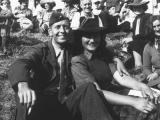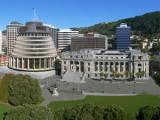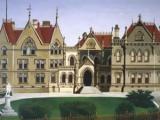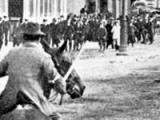The 24-year-old South Aucklander of Samoan descent became the second New Zealand-born holder of a recognised world professional boxing title by outpointing Mexican Andy Ruiz.
Auckland City
Events In History
The Big Day Out, an Australian franchise based on the successful Lollapalooza model, brought alternative, hard rock, hip hop and, more recently, dance acts together in a one-day festival in Auckland.
‘Tears, terror at the concert that made history’ was one of the newspaper headlines the day after the Queen St riot of December 1984.
United States Vice-President Spiro Agnew’s three-day visit to New Zealand sparked some of the most violent anti-Vietnam War demonstrations seen in this country.
New Zealand’s best-known bridge opened after four years of construction. The need for better transport links between Auckland city and the North Shore had long been the subject of inquiry and agitation.
It was near the end of the US First Lady’s surprise visit to New Zealand to meet American forces based in the country, inspect the work of the US Red Cross – whose grey uniform she wore throughout her seven-day stay – and study the contribution of New Zealand women to the war effort.
The Battle of the River Plate in December 1939 was the Allies’ first naval victory of the Second World War. The involvement of the cruiser HMS Achilles, more than half of whose crew were New Zealanders, was greeted with jubilation in New Zealand.
The first official New Zealand airmail to the United States left Auckland for San Francisco on Pan American Airways’ Samoan Clipper.
Coubray-tone news, the work of the inventive Ted Coubray, had its first public screening at Auckland's Plaza Theatre.
The New Zealand Banking Company, Auckland’s first bank, had been wound up two years earlier.
Agricultural and pastoral shows celebrating excellence in agriculture and animal husbandry became annual events in communities around New Zealand.
Auckland’s Anniversary Day commemorates the arrival of Lieutenant-Governor William Hobson in the Bay of Islands in 1840.
Articles
US Forces in New Zealand

The first American soldiers landed on New Zealand soil in June 1942, beginning an 'invasion' which would have a profound impact on both visitors and hosts over the next 18 months. Read the full article
Page 3 - Arrival
The ‘invasion’ began in Auckland on 12 June 1942, when five transport ships carrying soldiers of the US Army sailed into Waitematā Harbour. Two days later, Marines landed in
The House of Representatives

New Zealand's Parliament dates back to 1854, just 14 years after the signing of the Treaty of Waitangi and the beginning of the European settlement of the country. For most of its history as a nation state, New Zealand has had some form of elected government. Read the full article
Page 5 - First sitting, 1854
It started with a bang – 21 in fact, fired from the guns at Auckland's Fort Britomart. As soon as the smoke had cleared, New Zealand's first Parliament was under
Parliament Buildings

Parliament buildings have been modified, destroyed by fire, half-built and restored; the parliamentary places and spaces have formed an important part of New Zealand's history. Read the full article
Page 2 - First Parliament buildings
Auckland was a bustling place in 1854 when Parliament met there for the first time. The buildings were located in paddocks on what was then the edge of town, Constitution Hill,
The Beatles in New Zealand
When four young Liverpool musicians landed in Wellington on a lazy Sunday afternoon in June 1964, seven days of pandemonium erupted. Young New Zealanders flocked in their thousands to hear or just catch a glimpse of the famous 'Fab Four'. Read the full article
Page 1 - The Beatles in New Zealand
When four young Liverpool musicians landed in Wellington on a lazy Sunday afternoon in June 1964, seven days of pandemonium erupted. Young New Zealanders flocked in their
Page 4 - Auckland
Auckland fans were as riotous as those in Wellington. The Beatles' music went almost unnoticed as everyone commented on the
Regional rugby
The passion and parochialism of provincial rugby helped give the game a special place in New Zealand’s social and sporting history. Read brief histories, highlights and quirky facts about each of New Zealand's 26 regional rugby teams. Read the full article
Page 6 - Auckland rugby
History and highlights of rugby in the Auckland
The 1913 Great Strike

The Great Strike of 1913 was in fact a series of strikes between mid-October 1913 and mid-January 1914. It was one of New Zealand’s most violent and disruptive industrial confrontations. Read the full article
Page 5 - The 1913 strike in Auckland
Watersiders in Auckland began to strike in support of those in Huntly and
New Zealand’s first Governor, William Hobson, established Auckland as the colony’s capital in 1841 on land offered by Ngāti Whātua. Although the capital was shifted to Wellington in 1865, Auckland remained a major gateway to New Zealand, and grew into a prosperous port city. Auckland’s immense low-density suburbs have long been the first choice of residence for overseas migrants, and the city is now the country’s largest urban centre.
































































































































































